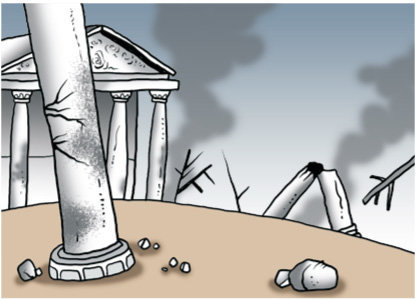Why the strong is defeated by the weak
Why the strong is defeated by the weak
Posted November. 01, 2022 07:54,
Updated November. 01, 2022 07:54

Caesar hired the German cavalry mercenary for his expedition to Gallia. After his death, Roman armies advanced to the Danube River after a bloody fight against the Germanic race. At the time, Germans were considered barbarians by Roman people. Who among the Roman soldiers then would have even fathomed that Rome would be demolished by these barbarians in 400 years?
Throughout history, there have been moments when different races and nations come across each other for the first time. Those moments were often filled with shock, fear, arrogance, or sometimes derision. In those times, some religious priests asked a pedantic question - Do those savages even have souls in them?
Numerous and once massive empires considered to be invincible had been swiped from the earth by these savages or small and weak countries. Historians wondered what had happened. Those who couldn’t come up with the answer with conventional logic often blamed the internal corruption of such empires. “A great empire collapse from the within” is the last ending statement that frequently appear at the end of classic movies featuring the fall of the Roman empire.
Abundant records written by advanced empires on their internal situations can be attributed to the reasons historians considered corruption as the cause. The more advanced and developed a society is, the more complications and accidents it suffers, just like there are more events in a city than in a countryside. The past empires had many of their historians, and they naturally were more interested in their world than those of savages.
In fact, the small tribes abolished or assimilated largely outnumber those stronger nations that had fallen by weaker nations. Still, what brings the final win in a lost game? Many historians have missed the fact that the winning armies are more advanced, feistier, and better adapted to new systems. Those who have been on the side of the strong under the name of an empire become complacent, which leads to illness of imbalance, meaning they would have neglected training and motivations for a fight believing that their advanced arms would do the work. In addition, with their abundant money, they would have hired mercenaries. Like that, complacency would have spread across the strong nations, focusing more on imbalanced and abstract indices such as population, economic power, arms, laws and regulation, and administrations. In the end, they would have lamented looking at the pillars of the burnt palace, “what happened to this great city…?”.
s24jeonghee@donga.com
Headline News
- Joint investigation headquarters asks Yoon to appear at the investigation office
- KDIC colonel: Cable ties and hoods to control NEC staff were prepared
- Results of real estate development diverged by accessibility to Gangnam
- New budget proposal reflecting Trump’s demand rejected
- Son Heung-min scores winning corner kick







